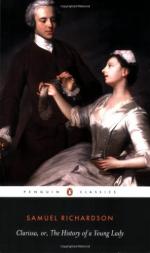It was in part the apprehension that this would be so with my dear Miss Harlowe, that made me carry her to a place where I believed she would be unable to escape me, although I were not to succeed in my first attempts. Else widow Sorlings’s would have been as well for me as widow Sinclair’s. For early I saw that there was no credulity in her to graft upon: no pretending to whine myself into her confidence. She was proof against amorous persuasion. She had reason in her love. Her penetration and good sense made her hate all compliments that had not truth and nature in them. What could I have done with her in any other place? and yet how long, even there, was I kept in awe, in spite of natural incitement, and unnatural instigations, (as I now think them,) by the mere force of that native dignity, and obvious purity of mind and manners, which fill every one with reverence, if not with holy love, as thou callest it,* the moment he sees her!—Else, thinkest thou not, it was easy for me to be a fine gentleman, and a delicate lover, or, at least a specious and flattering one?
* See Letter XXI. of this volume.
Lady Sarah and Lady Betty, finding the treaty, upon the success of which they have set their foolish hearts, likely to run into length, are about departing to their own seats; having taken from me the best security the nature of the case will admit of, that is to say, my word, to marry the lady, if she will have me.
And after all, (methinks thou asked,) art thou still resolved to repair, if reparation be put into thy power?
Why, Jack, I must needs own that my heart has now-and-then some retrograde motions upon thinking seriously of the irrevocable ceremony. We do not easily give up the desire of our hearts, and what we imagine essential to our happiness, let the expectation or hope of compassing it be ever so unreasonable or absurd in the opinion of others. Recurrings there will be; hankerings that will, on every but-remotely-favourable incident, (however before discouraged and beaten back by ill success,) pop up, and abate the satisfaction we should otherwise take in contrariant overtures.
’Tis ungentlemanly, Jack, man to man, to lie.——But matrimony I do not heartily love—although with a Clarissa—yet I am in earnest to marry her.
But I am often thinking that if now this dear creature, suffering time, and my penitence, my relations’ prayers, and Miss Howe’s mediation to soften her resentments, (her revenge thou hast prettily* distinguished away,) and to recall repulsed inclination, should consent to meet me at the altar—How vain will she then make all thy eloquent periods of execration!—How many charming interjections of her own will she spoil! And what a couple of old patriarchs shall we become, going in the mill-horse round; getting sons and daughters; providing nurses for them first, governors and governesses next; teaching them lessons their fathers never practised,




